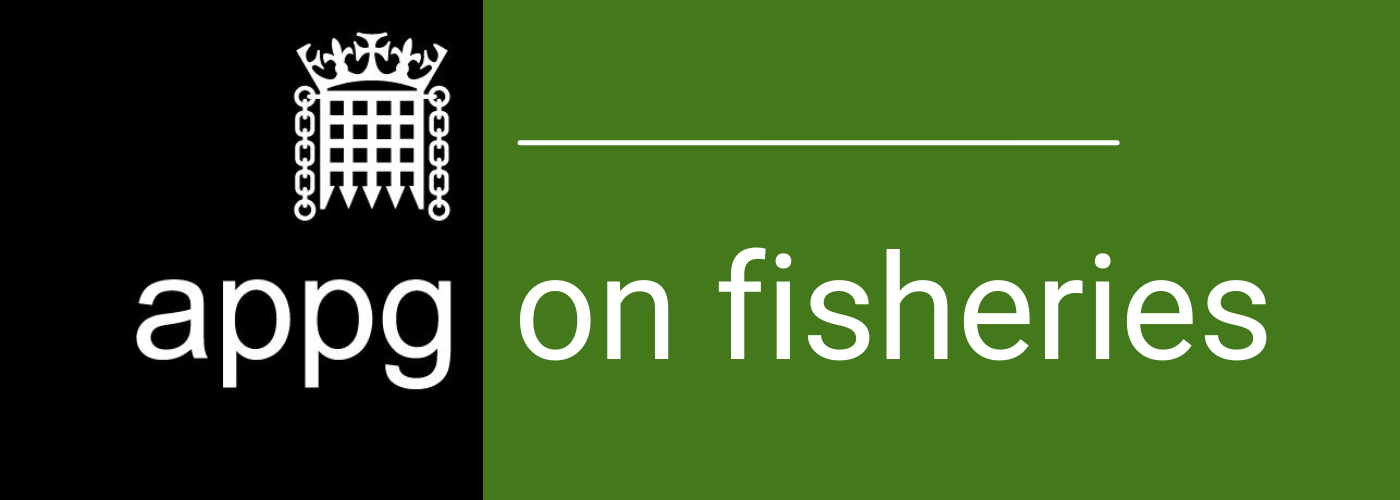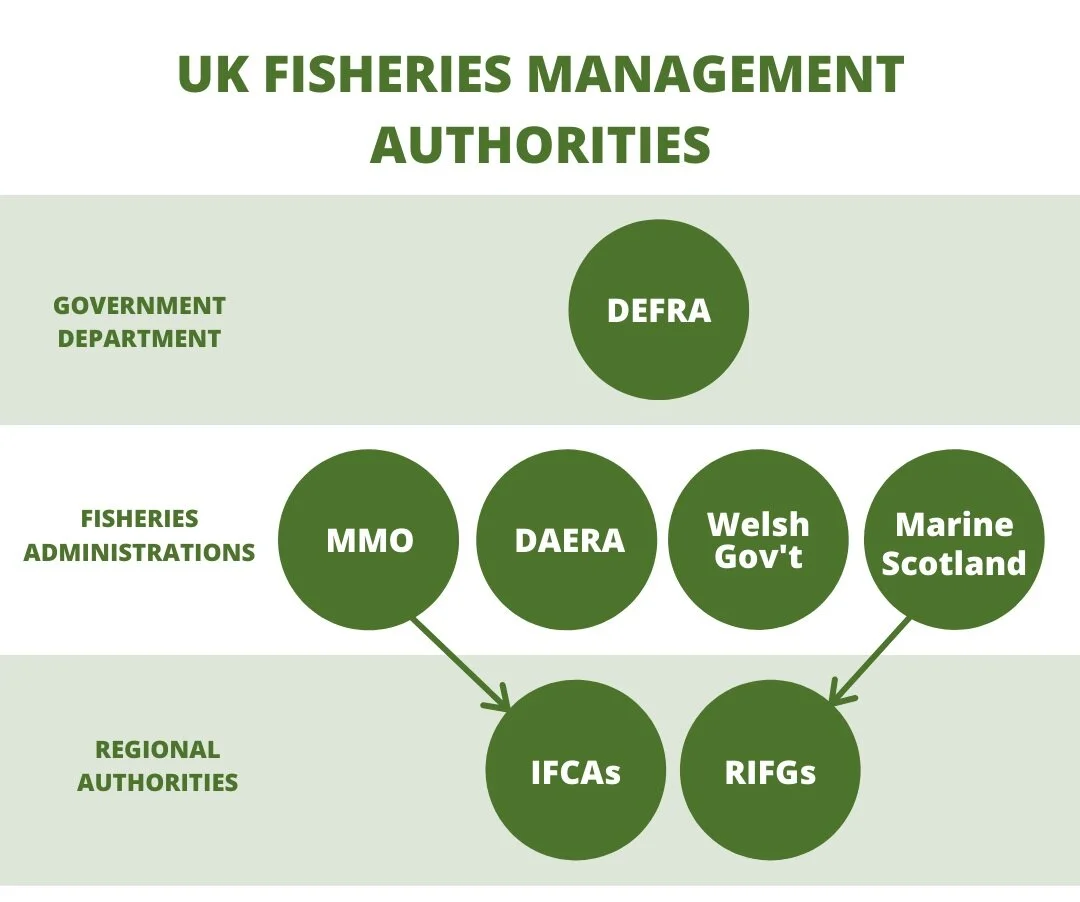Fisheries management in the UK involves a number of different authorities and organisations. This article provides a breakdown of the different players, who is responsible for what, and how they interact with each other.
In brief, Defra is responsible for broad oversight of UK fisheries policy and governance. Fisheries management is carried out by the devolved fisheries administrations: the Marine Management Organisation (MMO) in England, Marine Scotland in Scotland, DAERA in Northern Ireland, and the Welsh Government in Wales. Each home nation authority manages the distribution of quota between Producer Organisations (POs), non-sector vessels and under-10m vessels. Inshore fisheries are principally managed by regional bodies in England and Scotland (IFCAs and RIFGs, respectively), in contrast to Wales and Northern Ireland where a more centralised approach is taken. The main functions of all of these organisations are explained below.
Defra (Department for Environment, Food and Rural Affairs)
Defra is the government department responsible for UK fisheries policy, which the MMO and devolved authorities largely put into practice.
Responsible for shaping UK government fisheries policy
Apportions UK fish quotas amongst the four UK fisheries administrations
Liaises with Parliamentarians on fisheries matters
Leads the UK in fisheries matters at the EU, in particular access to the UK’s Exclusive Economic Zone (12 to 200 nautical miles)
MMO (Marine Management Organisation)
The MMO’s function is to promote sustainable marine development in England’s waters, in line with government policy. It supports marine businesses, the marine environment, and coastal communities.
Oversees Fixed Quota Allocation for English vessels - allocating a portion to the English POs, for them to manage among their members
Manages fishing quotas for non-sector and under-10m English vessels
Licenses English fishing vessels
Coordinates enforcement of fishing regulations in English waters
Administers financial penalties for non-compliance
Lead fisheries authority between 6 and 12 nautical miles offshore for England
Marine Scotland is a ministry under the jurisdiction of the Scottish Government, and also leads on monitoring and enforcement for Scottish vessels and Scottish waters.
Oversees Fixed Quota Allocation for Scottish vessels - allocating a proportion to the Scottish POs, for them to manage among their members
Directly manages fishing quotas for non-sector and under-10m Scottish vessels
Licences and manages Scottish fishing vessels
Monitors and enforces marine laws in Scottish waters
Undertakes scientific research and provides advice to Scottish government and others
Involved in marine spatial planning
DAERA (Department of Agriculture, Environment and Rural Affairs)
DAERA is the Northern Irish governmental department principally responsible for Northern Ireland’s waters, including quotas, monitoring and enforcement.
Oversees Fixed Quota Allocation for all Northern Irish vessels - allocating a proportion to the Northern Irish POs, for them to manage among their members
Directly manages fishing quotas for non-sector and under-10m Northern Irish vessels
Licences Northern Irish fishing vessels
Monitors and enforces legislation in Northern Irish waters
Manages Northern Irish inshore fisheries through its Inshore and Environment Branch
The Welsh Government takes a centralised approach to fisheries management.
Oversees Fixed Quota Allocation for all Welsh vessels - allocating a portion to the Welsh PO, for them to manage among its members
Directly manages fishing quotas for non-sector and under-10m Welsh vessels
Licences Welsh fishing vessels
Monitors and enforces legislation in Welsh waters
Manages Welsh inshore fisheries, supported by the Welsh Marine Fisheries Advisory Group
POs are membership organisations, principally, but not exclusively, for vessels over 10m. They get allocated a block of quota by the relevant fisheries administration and share it among their members. There are 24 POs in the UK (11 in England, 10 in Scotland, 1 in Wales, and 2 in Northern Ireland).
Distribute and manage their received Fixed Quota Allocations amongst their members (sector vessels)
Can trade or buy quotas with other POs on behalf of their members
Help market members’ catch
IFCAs (Inshore Fisheries and Conservation Authorities)
IFCAs are exclusive to England. Between them, the 10 IFCAs manage English fisheries out to 6 nautical miles, under the oversight of the MMO, which appoints membership of their committees.
Lead fisheries authority up to 6 nautical miles offshore in England
Each manages the exploitation of sea fisheries resources in an allotted district, through self-developed, area-specific byelaws
Seek to balance environmental, social, and economic factors
Manage Marine Protected Areas and other regional responsibilities out to 6 nautical miles
Include public body representatives from MMO, Natural England and Environment Agency
Regional Inshore Fisheries Groups (RIFGs)
Scotland’s 5 non-statutory RIFGs act as an important consultative group for Scottish fisheries out to 6 nautical miles.
Marine Scotland retains oversight of operations and legislation
Focusing on improving management of Scotland’s inshore fisheries out to 6 nautical miles at a regional level
No management authority (with the exception of the Shetland Shellfish Management Organisation)
Aim to give inshore fishermen a stronger voice
Complemented by the Inshore Fisheries Management and Conservation Group (IFMAC), which focuses on national inshore issues and inshore areas not covered by RIFGs (i.e. 6-12nm)
Cefas is an executive agency of Defra and has no legislative power, but does advise Defra on evidence-based policy and legislation.
Provides UK-wide advice and assessments on fisheries and aquaculture issues issues, based on scientific data such as stock assessments
Provides research, consultancy and other expertise for customers in the UK and across the world
Seafish is a non-departmental public body and a key delivery partner of Defra. They do not have a defined role within fisheries management. Their principal role is to collaborate with and promote the UK seafood industry.
Works with the seafood industry to promote quality, sustainable seafood
Source of economic information for the industry and policymakers
Carries out and supports research and projects into seafood industry
Please note that the APPG on Fisheries Secretariat is independently managed, and does not speak on behalf of the government. The Secretariat undertook thorough research to ensure the accuracy of this article as of August 2020. The principal sources used were:
Fisheries Management in the UK (Dec 2018) - Briefing Paper 8457, House of Commons Library
UK Fisheries Management (Feb 2018) - POSTnote 572, Parliamentary Office of Science & Technology
Scottish Government, Sea Fisheries (accessed Aug 2020)
Scottish Government, Allocating and Managing Scotland’s Quota (accessed Aug 2020)
Scottish Government, Fishing Vessel Licensing General Guidance (accessed Aug 2020)
DAERA, Fishing Vessel Licensing (accessed Aug 2020)
DAERA, Quota Management (accessed Aug 2020)
Welsh Government, Quota Management Rules (accessed Aug 2020)
If you believe there may be inaccuracies or updates needed, or if you wish to quote any of the APPG’s publications, please get in touch.




